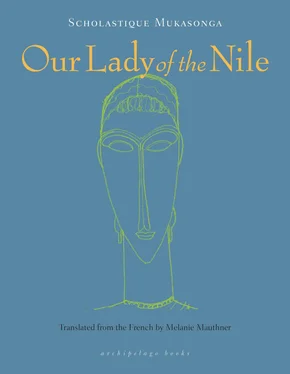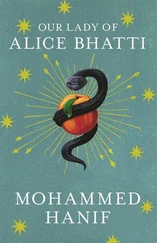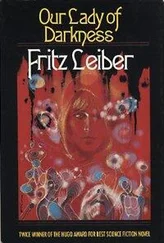“It’s all here in this bag,” said Gloriosa, “everything we need for tonight.”
Gloriosa opened the bag and Modesta saw that it contained a hammer, a file, and a flashlight.
“Where’d that come from?”
“Butici, the mechanic guy borrowed it for me from Brother Auxile’s workshop.”
“Did you give him money?”
“No need. He knows who I am. He was more than happy to help me out.”
“And how are we going to get out of the lycée at night?”
“You’ll come get me from my guest room, since they put you back in the dorm. They won’t refuse you that. Anyway, I’ll ask them to let you come. It won’t be hard to jump the wall behind the Bungalow, I’ve checked where there’s a gap.”
“So you still want to do what you said?”
“More than ever! Now that I’m a heroine, and you too, they’ll say it’s another one of our exploits, and believe me, it will be.”
“You know very well it’s all based on your lies.”
“It’s not lies, it’s politics.”
“We’ll set off when everyone’s asleep,” said Gloriosa. They waited for the lycée to sink into slumber. First there was the hubbub of the girls as they returned to their dorms, followed by the murmur of the last prayer they recited before climbing into bed. The ringing bell and the creaking gates signaled the start of curfew. Half an hour later, the purring of the generator ceased. The watchmen, spear or machete in hand, made their last round, then wrapped up in their blankets at the foot of the gate and fell asleep, despite instructions to the contrary. No lamp shone at Mother Superior’s office window. “It’s time,” said Gloriosa. “Let’s go.”
They scaled the wall at the end of the garden without any difficulty, and enveloped themselves in their wraparounds. “Here, you carry my bag,” Gloriosa told Modesta. “I’ll go in front.” They paused at the edge of the track. The familiar landmarks had vanished into the night. It was as if the mountains had swelled with a thick mass of darkness that filled even the vertiginous drop, at the bottom of which the lake could be glimpsed.
“We’ll get lost,” said Modesta, “switch on the flashlight.”
“It’s too dangerous. There could still be some army patrols or militants roaming around. I really scared them with my Inyenzi.”
They managed to feel their way along the track and reached the parking lot overlooking the spring. The trail leading down to the spring had been evened out and graveled, in readiness for the pilgrimage no doubt. Gloriosa switched on the flashlight. They rounded the huge rocks, and to their surprise found a ladder leaning against the platform. “See,” said Gloriosa, “we’re in luck, it’s a sign that we’re carrying out a patriotic act: the gardeners who came to clean the shelter and decorate it with flowers have left their ladder.”
Gloriosa climbed onto the platform and, clutching the hammer, the file, the coil of clay, and the flashlight Modesta passed to her, wriggled around in front of the statue and kicked over the vases of flowers, which fell into the spring water pooling in the basin. Balancing precariously on the edge of the platform, Gloriosa dealt the Virgin’s nose such a blow with the hammer that the head of the statue shattered to pieces. She clambered down from the platform and turned to Modesta, who was shivering with cold and worry.
“I’ve broken Mary’s head, it’ll be impossible to fix her nose. But at least now they’ll be forced to replace the statue.”
“And what will happen to us? What a hideous sin!” Modesta whined. “If they ever realize it was us who did that …”
“Modesta, you’re always worrying. I already know what I’m going to do.”
At dawn, the lycée was filled with joyous effervescence. The great day had arrived, pilgrimage day! The girls took out their new uniforms, which had had their first outing for the Queen’s visit, but the patch with the Belgian colors had been gently removed from the bolero jacket and replaced with one provided by Father Herménégilde, embroidered with the intertwined colors of Jesus and Mary.
Everyone gathered in the yard, in front of the chapel, each class lined up behind the banner that the girls had been embroidering in sewing class since the start of the year. Father Herménégilde blessed them and Brother Auxile handed out stenciled sheets of his latest hymns. Sister Bursar counted out cans of sardines, corned beef, Kraft cheese, and jam, which she packed into large baskets that the lycée hands then hoisted onto their heads. Silence fell when Mother Superior appeared on the chapel steps flanked by the mayor, the two gendarmes — with guns on their shoulders — and all the teachers. She made a short speech reminding them of the history of Our Lady of the Nile, urging everyone to conduct themselves most piously, and, turning to the mayor, she declared that this year they’d be making a special plea to the Black Virgin to bring peace and harmony to the thousand hills of this beautiful country.
The procession moved off, walked through the gates guarded by the militants, followed the track along the ridgeline, then proceeded down the path and arranged themselves, class by class, on the slope facing the spring. Suddenly, there was a shriek of horror: the Virgin had lost her head, or rather what was left of it resembled cracked pottery. The Madonna’s face had been smashed, and the shards lay scattered on the platform. Flowers floated on the water of the basin, which was threatening to overflow, since one of the vases had blocked the drainage channel.
“Sacrilege! Sacrilege!” shouted Mother Superior.
“It’s the devil’s work,” cried Father Herménégilde in turn, making frantic gestures of blessing, as if he were performing an exorcism.
“Sabotage,” muttered the mayor, dashing behind the rocks, his arm soon appearing above the decapitated statue holding a black ball.
“A grenade!” yelled a white teacher, before running up the path, his colleagues close behind, as they climbed the slope with newfound agility.
One of the gendarmes raised his rifle to his shoulder and fired toward the bottom of the hollow, into the spreading ferns, beneath which flowed the stream.
Panic spread among the girls. They jostled and trampled each other, stampeding up the path, oblivious to the orders, pleas, and entreaties of Mother Superior entangled in her long dress, of Father Herménégilde gathering his cassock, of the panting mayor, who brandished the dirty black ball crying: “It’s nothing, it’s nothing, it’s just clay!” The lycée hands had dropped the large baskets of provisions they’d been carrying, and the cans were now rolling down the hill, to the great despair of Sister Bursar, who’d quickly given up trying to run after them.
All the fugitives gathered in the lycée yard. Everyone caught their breath. “To the chapel,” ordered Mother Superior, and when everyone had taken their place in the pews, she spoke:
“My girls, you witnessed this ghastly sacrilege. Impious hands — I don’t wish to know whose — have violated the sweet face of Mary, our protector, Our Lady of the Nile. It befalls us to expiate this crime against God. We shall fast. Today we shall eat nothing but boiled beans. May God forgive the person or persons who committed such a sin.”
That’s when Gloriosa slipped out of her row of pews and walked up to the altar steps. She whispered in the ear of the mayor, who then went over to Mother Superior. They conferred quietly together for a long while. Finally, Mother Superior blurted out:
“Gloriosa has something to tell you.”
Gloriosa rose to the highest step before the altar. She scanned her schoolmates, giving several of them a mocking or satisfied smile. As soon as she began to speak, her booming voice made everyone jump:
Читать дальше












